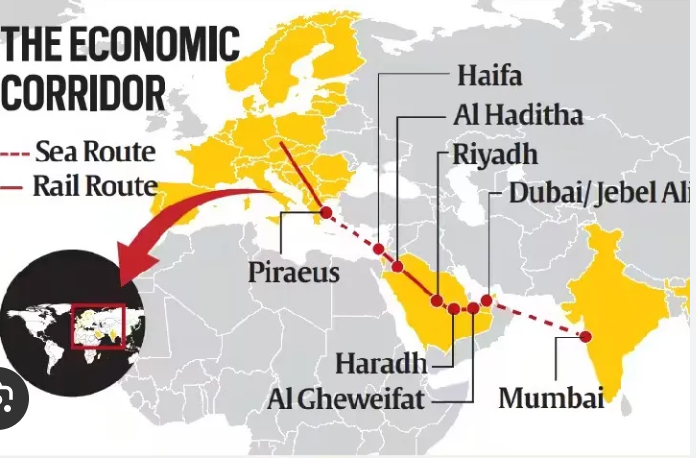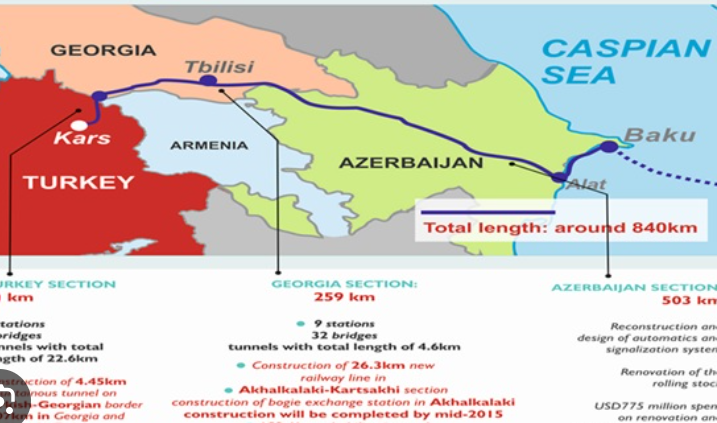Turkish President Recep Tayyip Erdoğan has said there can be no trade corridor between the East and Middle East or Europe “without Turkey” — a statement seen as a pushback against the India-Middle East-Europe Economic Corridor that was announced on the sidelines of the New Delhi G20 Summit.
The new Rival to Chins’s Belt and Road initiative has started poorly, with EU and US not even mentioning the name of Turkey, adding to Ankara’s fears of being economically excluded from global trade chains and routes.

Turkey is part of the China backed global infrastructure project — One Belt One Road Initiative (BRI) — which the India-Middle East-Europe Economic Corridor backed by the US is seemingly countering. The proposed corridor, announced Saturday, will link India with the Middle East and from there to Europe. It aims at doing this by bypassing Turkey.
“There cannot be a corridor without Turkey. Turkey is an important production and trade base. The most convenient line for east-to-west traffic has to pass through Turkey,” Erdoğan reportedly told journalists on his return flight from India, according to Hürriyet Daily News, an English language newspaper in Turkey.
The proposed route clashes with Turkey’s corner of the Belt and Road, called the middle-corridor:

The South Caucasus is the shortest geographic area which would allow China’s westernmost parts to connect with the EU. This is often referred to as the “Middle Corridor,” which runs from Turkey via Georgia and Azerbaijan and then across the Caspian Sea to Central Asia and China.
Throughout 2022, China was somewhat hesitant to openly support the expansion of the Middle Corridor, which was evident in its lack of statements on the matter. Beijing was likely hoping for a quick conclusion to the war in Ukraine. As the war has dragged on, a return to the northern route has become harder to imagine.
This realization exacerbated the need to develop alternative routes. Recently, the Chinese side made some interesting statements. In an interview, the Chinese ambassador to Georgia evaluated the Middle Corridor’s chances while also emphasizing the importance of both the EU and China’s involvement within the project. He specifically highlighted the need to circumvent Russian territory — a clear indication of changing Chinese perspective.
Erdoğan had attended the G20 summit, which was held from 8-10 September in New Delhi.
As reported earlier, India, the US, United Arab Emirates (UAE), Saudi Arabia, the European Union (EU), Italy, France and Germany came together Saturday, to launch an ambitious infrastructure plan connecting India to Europe through the Middle East.
The India-Middle East-Europe Economic Corridor would reshape the trade routes between the Gulf, Europe and South Asia and connect them by rail and sea links.
The project would consist of two corridors — the eastern corridor linking India to West Asia and the Middle East and the northern corridor linking West Asia and the Middle East with Europe.
India will likely be connected with the UAE via sea links to the Dubai port, and this would likely be the starting point of the railway line connecting UAE to Saudi Arabia, Turkey, Israel and Europe.
While the agreement signed Saturday did not have any binding financial agreements among the partners, the parties agreed to draft an action plan within 60 days for the corridor.
Separate West Asia corridor with Europe
According to Middle East Eye — a London based news agency that focuses on North Africa and the Middle East — President Erdoğan said he was aware of many countries looking to expand their influence through the creation of trade corridors.
Significantly, Ankara backs the Iraq Development Road Project — a corridor connecting the Gulf with Europe through Turkey.
Erdoğan revealed that discussions were held with Gulf countries regarding an agreement on the Iraq Development Road Project during the G20 Summit.
“We are talking about a corridor to Europe through Iraq, Qatar, the UAE and Turkey,” the Hürriyet Daily News quoted Erdoğan as saying.
Follow our English language YouTube videos @ REAL TURKEY: https://www.youtube.com/channel/UCKpFJB4GFiNkhmpVZQ_d9Rg
And content at Twitter: @AtillaEng
Facebook: https://www.facebook.com/realturkeychannel